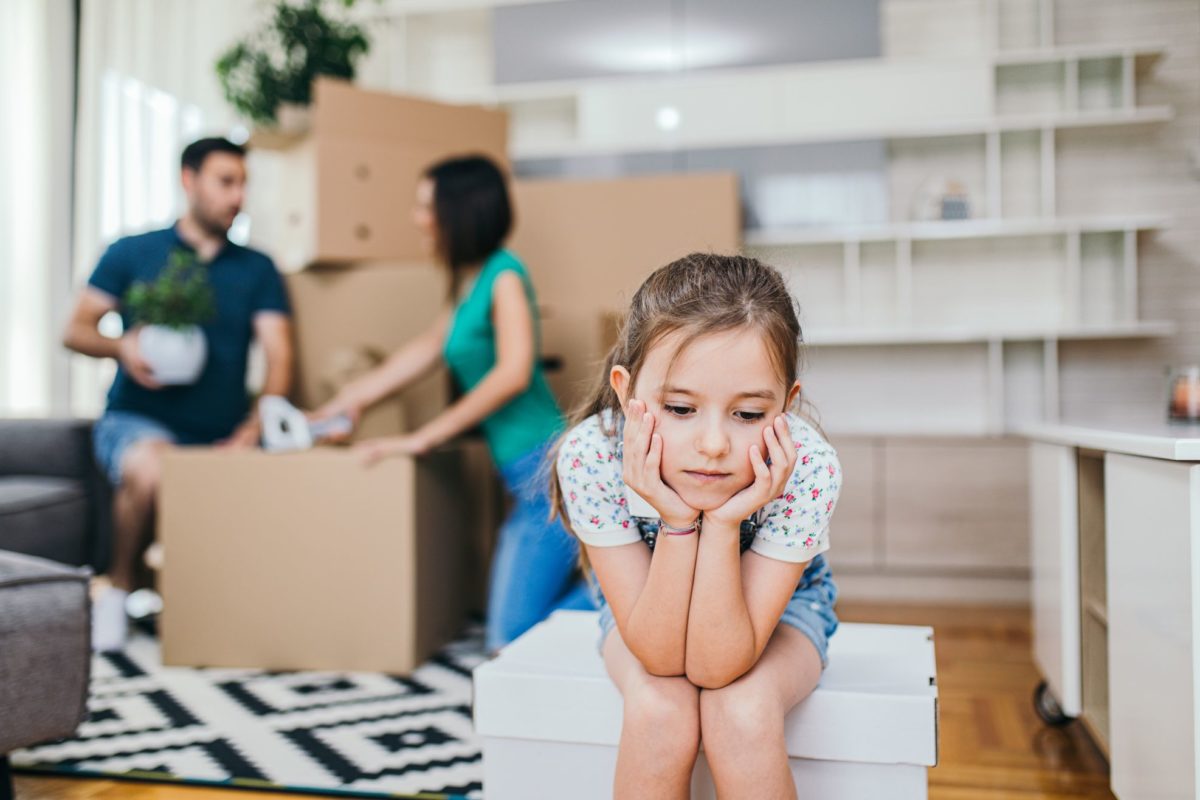Naturally, you must have some difficulties when relocating – you’ll be under plenty of stress if nothing. But, psychology says that, for most people, long-distance moves are more than that. They mean great change and many emotional moments that are bound to have some effect on you in the long run. Will those long-term effects be bad or good for you? We are here to help you get to the bottom of this. Let’s solve this dilemma once and for all.
What are the Most Common Psychological Effects of Moving Frequently on Kids and Adults
If you have moved at least once in your life, you know that relocations are one of the most stressful things you can imagine. Sure, moving cross country one time is a chaotic experience, but imagine having multiple long-distance moves. Are there psychological effects of moving frequently? Does this affect a person on some emotional or cognitive level? How can you prevent any harmful effects from happening to your or your family in case you have to move often?


Psychological Effects of Moving Frequently – Can Moving a Lot Cause Trauma?
Can relocation stress be strong enough to cause trauma or any harmful changes in how we think and feel? Well, maybe not packing your house per se, but relocation can be tough on a person. A stress-free move is possible to accomplish if you know how to move efficiently, but the fact remains that you might have some trouble adjusting to another country or even state. Some will adapt better, and some will need a bit of time – that’s just basic psychology. Eventually, people will get used to their new surroundings, even if they’ve gone through relocation depression. But what happens to those who move fairly often? Do they learn to adapt quicker after each move, or do they struggle more and more after every change of scenery?
Is Moving Around Too Much Bad for Your Mental Health?
Will you harm your mental health and well-being if you move around the country or the world plenty of times in your life? People have countless reasons to move. It can be for a job that requires frequent changes of place or for your partner – relocating for a relationship is also not rare. Maybe you’re just addicted to adrenaline and have wanderlust, or you have military relocations. Whatever it is, you must be wondering if it will do you harm in the long run. Psychology has an interesting take on this subject. It says that, even though a frequent change of home and starting anew might have unpredicted consequences later in life, relocations also do plenty of good to a person. So, we can’t exactly say that relocating to a new home more than a few times is either good or bad. Let’s see the possible effects of it.


How Does Moving a Lot Affect a Person?
First of all, we must state one crucial fact. Frequent moves, whether they are moves to another state or another continent, don’t have to make an impact on your well-being. They can – but they don’t necessarily have to. Nothing will happen to some people, and yet, some might struggle. You can’t know what will happen to you, so it’s best to be informed about the possibilities that psychology offers us.
Having Relocations Often Means Being Under Huge Stress More Frequently
People are so used to stress that they take it for granted. Sure, we all have to endure some amount of pressure in our personal or professional lives, but that’s not the same as the stress of organizing a move. This process has many steps – deciding where to live and then figuring out how to choose a relocation company (that will provide you with the best relocation services) are only the first of many.
If you expose yourself to this life-altering process commonly, the stress accumulates. That can lead to mental health struggles or even changes in physical well-being. Stress is a powerful aggressor, so worrying over tiny things is best avoided if we can help it. In this case, that just means you shouldn’t lose nerves over stuff like packing fragile items or decluttering and overthinking about what to keep when you move.
Emotional Effects of Moving to a New Place
The emotional aspect of relocations is probably the hardest thing to deal with. You miss your old house, friends, and family, even that little coffee shop around the corner that had the best latte to keep you through the tough mornings at work. Being sentimental after your move is almost unavoidable, even if you are a pretty cold person. You will feel like this for some time, and then you’ll make new friends and find another coffee shop.
You will also find a job after the move, and everything will be great in life again. That’s one of the funny things about life – people can adapt to anything if you give them enough time. But if you move to another place pretty soon after you’ve just gotten rid of adjustment insomnia, you will most likely cause some hardship for yourself.


Kids Who Often Move to New Places May Have Trouble Making Friends, But They Also Have Better Ability to Remember Things
The emotional impact of repeated moves during childhood can vary for different children. Introverted kids are most likely to suffer after relocating to another city – they are less out-going, which means they need longer to form friendships. Once they finally do, their lives are uprooted again, and they have to start all over again. Extroverted children will suffer less severely. Losing friends and stability is especially hard on adolescents. They are easily frustrated even in the best of circumstances – when you face them with relocations (especially in the middle of the school year, if you’re relocating in the winter), it will come as no surprise that they’ll try to resist the change. It’s their way of dealing with difficulties.
Better Memory As a Result of Often Relocations
Some research shows that kids who move often have developed better abilities to remember situations they’ve experienced. This is proven to be very common. Kids will retain details of places they’ve lived in, and events around the relocations will be especially highlighted. A strong memory is a trait that will persist well into adulthood – and that’s a trait that anyone would like to have.
Relocating Is Often Connected to Difficult Circumstances in Life
This is one of the reasons why kids rarely pay attention to the benefits of relocating and often hate changing houses. When we say difficult circumstances, we mean things like parents’ divorce, the death of a loved one, or even relocating because the family is expanding. You might be happy about baby-proofing a house for your newborn, but your kid will view this as a highly emotional event. The jealousy between siblings is a commonly-known phenomenon. So, the conclusion we can draw from this is that mental health issues might not even have anything to do with relocations but rather with the traumatic events surrounding them.


Adults Who Frequently Change Residence Can Have Higher Levels of Stress, But They Adjust to Changes Quickly
We’ve mentioned how stress is the critical problem with relocations and that people who move often are more often under pressure. So, obviously, those who rarely move are less likely to be under severe stress. Of course, countless other factors can contribute to stress, which means you can move often and have little to no mental health issues, and never move but suffer seriously.
The key to managing stress that constantly repeats as you move from one city to another is learning to adjust quickly and plan your relocations better. If you feel less anxiety about the move and handle the tasks on your relocation to-do list slowly, without a care in the world, you won’t be as stressed out and exhausted after the move is over. That means you will be able to focus on adjusting to your city, and you’ll go out and make friends.
So, the pre-relocation period can affect the post-relocation one. If you organize everything correctly and don’t rush to pull off a last-minute move, you can save plenty of nerves and keep your energy intact. The video below can help you plan a perfect move – check it out, even if you’ve moved countless times before. It will improve your relocation skills, and you’ll fix your relocation mistakes.
What About Adults Who Moved Often When They Were Little?
So, you’ve moved a lot as a kid, but now you’re all grown up – can those moves from years ago affect you now? Unfortunately, it is possible, but it doesn’t happen to everyone. Which problems can occur in this situation? Those who have moved often as a child are more likely to see relationships with others as disposable. That means they struggle to make long-term friendships or commitments. In other words, they have attachment issues. But, there’s a bright side – this problem can be resolved if a person works on themselves. The hardest thing is recognizing the issue in the first place.


Psychology Says There Are Plenty of Positive Consequences of Relocating
So, now that we’ve explained the dark side of relocations let’s get to the fun part. Why is relocating good for you? There are countless reasons why you can benefit from a change of scenery, but the most important thing to keep in mind is probably stepping out of your comfort zone. This is a huge accomplishment that leads to plenty of excellent opportunities.
Why Is Moving Good for Mental Health?
You’ve stepped out of your comfort zone, so what? Is it really a big deal? Most certainly, and not only for the reasons you’d think. Sure, it’s great that you’ve gotten a job that requires relocation, so you have to move because of that, or you’re starting college (in that case, you’ll need a college packing list – trust us) in another state. But that one obvious benefit that made you move isn’t the only healthy thing for you. What else will you gain by relocating? We have the list:
- You get to have a fresh start – it will feel like a mental cleanse,
- You will make friends and learn which friendships can survive the distance,
- You will rely on your family during the relocation period, which will bring you closer,
- You will grow as a person from this experience,
- You get to enjoy all the amenities of another city,
- You get to decorate your house, which is pretty relaxing.


Everything Has Its Pros and Cons, and It’s Up to You to Decide If You Can Handle Frequent Changes – Can You Do This?
As you can see, things aren’t either good or bad – it’s usually a mix of both. So, the question you should ask yourself is this – should you stay in your current city or move to a new home? Are you brave enough to dive head-in into changes? We believe you are. Now, all you need is to decide where you’re heading next and get yourself proper packing services and cross-country movers to help you get to the destination of your dreams.
FAQ
What Are the Most Common Psychological Effects of Moving Frequently on Kids and Adults?
The psychological effects of moving frequently on kids and adults often include stress, anxiety, and difficulty forming long-term attachments. Children may struggle with instability, while adults face emotional fatigue from constant change. Each move requires readjusting routines, relationships, and identity. Over time, this can lead to restlessness or detachment. Establishing consistent rituals between moves helps reduce these effects. Creating emotional stability across transitions is vital for maintaining mental well-being.
How Does Moving Frequently Affect Children’s Emotional Development?
One of the biggest psychological effects of moving frequently on kids is disruption to emotional security and friendships. Constant relocation can make it hard for children to trust new people or adapt to unfamiliar environments. They might experience sadness or frustration at repeated goodbyes. Parents can help by maintaining family routines and open communication. Encouraging kids to stay connected with old friends also helps. Offering emotional reassurance and stability makes transitions easier for young minds.
How Can Frequent Moving Impact Teenagers’ Mental Health?
The psychological effects of moving frequently can be particularly intense for teenagers navigating identity and social belonging. Frequent moves may lead to feelings of isolation or low self-esteem. Adjusting to new schools repeatedly can cause academic stress and peer pressure. Encourage involvement in extracurricular activities to foster connections. Keep lines of communication open with both your teen and teachers. Supporting positive social adaptation helps reduce the mental strain of frequent relocation.
What Psychological Effects Does Moving Frequently Have on Adults?
For adults, the psychological effects of moving frequently often include stress, burnout, and emotional exhaustion. Constant relocation disrupts stability and long-term planning. Forming friendships becomes harder, leading to loneliness or detachment. Adults may also struggle with maintaining identity and purpose when routines constantly change. Creating a support network early in each new place can help. Prioritizing self-care and emotional grounding makes frequent moves more manageable.
Can Moving Frequently Lead to Relationship Challenges?
Yes, one of the psychological effects of moving frequently is strain on relationships due to distance and adjustment stress. Couples or families may experience tension while adapting to new surroundings. The lack of familiar support systems can amplify conflicts. Regular communication and setting shared goals help maintain unity. Plan together to build new friendships and routines in each location. Developing mutual understanding and flexibility strengthens bonds during transitions.
How Does Moving Frequently Influence a Child’s Academic Performance?
The psychological effects of moving frequently on children can extend to academic challenges. Frequent moves disrupt learning continuity and social integration at school. Kids may fall behind due to curriculum differences or stress. Teachers can play a key role in easing this adjustment by offering extra support. Parents should stay involved in school activities and homework. Ensuring educational consistency across moves helps children maintain academic confidence.
How Can Families Cope With the Psychological Stress of Moving Frequently?
Families can manage the psychological effects of moving frequently by focusing on teamwork, communication, and preparation. Discuss each move openly and involve kids in the planning process. Keep family traditions consistent to provide comfort and familiarity. Support each other emotionally through the adjustment phase. Seek professional guidance if stress becomes overwhelming. Maintaining family cohesion and routine helps reduce anxiety and create resilience.
What Are Healthy Coping Strategies for Adults Who Move Often?
To manage the psychological effects of moving frequently, adults should develop strong coping strategies centered around routine and self-care. Exercise, journaling, and mindfulness can reduce relocation stress. Joining social or professional groups helps rebuild community ties faster. Focus on the positives—new opportunities, growth, and experiences. Avoid isolating yourself during the settling phase. Practicing consistent emotional self-care makes each move feel less disruptive.
Are There Long-Term Psychological Effects of Moving Frequently on Kids and Adults?
Yes, the long-term psychological effects of moving frequently on kids and adults can include difficulty maintaining close relationships or long-term stability. Frequent movers might develop a tendency to detach quickly from people and places. While adaptability increases, emotional depth in connections can decrease. Building mindfulness and strong family ties can counter these effects. Counseling may help process unresolved emotions from constant change. Investing in emotional awareness and connection ensures healthier long-term adjustment.
How Can Parents Minimize the Negative Psychological Impact of Frequent Moves on Children?
Parents can reduce the psychological effects of moving frequently on children by keeping communication open and creating stability wherever they go. Establishing routines like family meals or bedtime stories provides consistency. Encourage kids to express their feelings and fears. Maintain connections with old friends through calls or letters. Reward adaptability and courage during transitions. Fostering emotional security and openness helps kids view moves as growth opportunities rather than losses.






